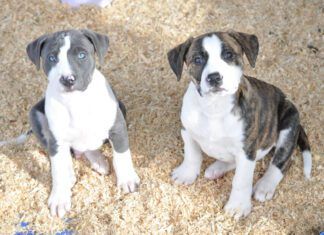Have you ever seen your dog’s body jerk with what appeared to be a hiccup? Yes, dogs can get hiccups. A hiccup is described in medical terms as a myoclonus of the diaphragm. A myoclonus is a sudden shock like contraction of a muscle. The diaphragm is the internal muscle between the chest and abdomen.
What Do Dog Hiccups Sound Like?
Hiccups in dogs look very similar to hiccups in people. There’s a quick jerk or jump of the chest that appears to be involuntary. This is usually repeated several times in a rhythmic pattern. It may be silent, or there may be an audible grunt, squeak or puff of air associated with the hiccup. It has been described as the sound of a drop of water from a leaking faucet. The dog usually appears unperturbed.

Why Do Dogs Get Hiccups?
Hiccups, in and of themselves, are a benign phenomenon. They are a rite of passage for puppies, one of those super cute things that they outgrow…like puppy breath. Enjoy both while they last!
Are They Ever Something To Worry About?
Adult dogs can also get hiccups, but they are way less common, and possibly less benign. The question becomes, is there something new that is irritating one of the nerves involved in the hiccup pathway. These include the phrenic nerve which passes over the heart, the vagus nerve (which travels up the side of the neck), the cervical spinal cord, and the brainstem.
The medical workup for persistent hiccups in an adult dog starts with a physical exam. Initial diagnostic tests generally include x-rays of the chest and abdomen and baseline blood work. Your veterinarian is looking for things like tumors, heart enlargement, stomach issues, hiatal hernia (an abnormality of the diaphragm), and electrolyte derangements in the blood.
Sometimes gastrointestinal diseases like inflammatory bowel disease and reflux esophagitis can trigger hiccups. If your dog shows any signs associated with these diseases, treatment specific to the underlying disorder should resolve the hiccups as well.
How To Stop Your Dog’s Hiccups
If your hiccuping dog gets a clean bill of health from your veterinarian, there are a few tricks you can try to stop hiccups. Smaller meals more frequently throughout the day, as opposed to fewer, larger meals may help. Distention of the stomach is thought to perhaps tickle the diaphragmatic nerves. Sometimes putting a little sugar on the back of the tongue works. And finally, a finger touch to the back of the throat, similar to what you might do when “pilling” a dog, will sometimes stop hiccups. If all else fails, ask your veterinarian about gabapentin, a neuropathic pain medication which has been used successfully for hiccups in humans.







My adult dog gets hiccups occasionally and it sends him into a panic, as if he’s going to throw up. Mostly they hit in the middle of the night, but sometimes during the day as well. He desperately wants to get outside to eat grass and almost try to outrun them; he pulls so hard on the leash and just plows forward to find more grass. It always takes me a few minutes to realize it’s hiccups and not diarrhea when he doesn’t actually do anything. I can sometimes get him to call down enough to stay inside and let me soothe him through it without the 3am trek through the dark. A spoonful of honey, sometimes diluted and warmed up with water or a bit of yogurt added to it help him calm down and feel better. The vet didn’t find anything wrong and prescribed him an antacid (I think that’s what it was) to take in the moment and recommended having a bit of food before bedtime in case it was acid reflux. I just read the other day that it could be pericarditis, so I’ll have to keep an eye out for that now too.
How funny! A teaspoon of sugar on a persons tongue & suck on it slowly works for people also!
This is interesting. I adopted a 13-year-old dog about 7 weeks ago. He had a bad cough when I pulled him from the shelter, I had been visiting him there regularly for a week every day before I brought him home. I had been taking him for walks. During the course of that week they did a full dental and pulled all of his teeth out. The day after that was the day that the cough appeared. It was slight at first but each day that I went to see him for the next 4 or 5 days the cough was a little bit worse than it had been the day before. Their initial explanation that it could have been caused by the tube down his throat while he was under anesthesia for the dental made sense the first day, thinking perhaps his esophagus had been sore. But when the cough proceeded to get a little bit worse every day and not better I disregarded that assessment from shelter staff. It did not sound like kennel cough cuz it did not have that classic Goose honk. It was a dry hacking cough. I got him to the vet the day after I brought him home and the vet did a quick exam, not a thorough one and listened to his heart and declared that the heart and lungs sounded good so we were not worried about congestive heart failure. I had been concerned that the coughing could be a heart problem. We put him on clindamycin for a week and the cough mostly cleared up but it is not disappeared completely. I found out two weeks after I brought him home that they did of course have an outbreak of some sort of respiratory problem at that shelter although it was not kennel cough. I had tried to warn them that I thought he was sick and they pooh-poohed it so that’s a whole different issue with the shelter. Anyway, it’s been about 5 to 6 weeks and he’s not coughing the way he had been when I brought him home but what I’ve noticed is that while he is fine with exercise and goes for pretty vigorous walks every day, the coughing does start again when he’s lying down. It’s not all the time, it’s not consistent, it’s not so bad that I felt like I needed to take him back to the vet but in the back of my head I’ve had a lingering question as to whether or not it’s possible he has an enlarged heart. I’ve had many Senior Dogs and I’ve seen this many times. It does not present like heart congestion and he does not have a heart murmur. But another thing I’ve learned over the years from Senior Dogs of my own and a pet sitting business I had for 20 years is that sometimes when a dog has an enlarged heart they will posture differently and hold their front left leg at an angle to compensate to make space in the chest cavity for the enlarged heart. It can be ever so slight or it can be dramatic but I’ve seen it a number of times and every time I’ve seen it it has turned out that the dog has had an enlarged heart problem. I noticed the other day when I was looking at him straight on that he was holding his left leg ever so slightly apart from his body the way I’d seen my other dogs and a couple of customers dogs do when it turned out they had enlarged hearts. I had already decided I needed to get him back to the vet for a full work up heart exam and probably do an ultrasound and an ECG. Last night for the second time this week while he was lying in bed sleeping he had a bout of the hiccups. At the time I thought it was funny and I felt sorry for him cuz they seemed to last for a good 5 to 10 minutes, but now I’m reading this article and I’m wondering if that’s not yet another sign that this dog has an enlarged heart. So I will be making a vet appointment for him next week to get this looked into. Apparently hiccups are not always as benign as they appear to be.